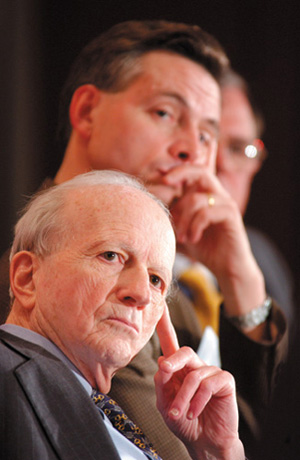 Chicago
Journal
Chicago
Journal
When free trade and terrorism
mix
Even economist Gary Becker,
AM’53, PhD’55, was flummoxed by the title of
the Graduate School of Business panel discussion he headlined
this past March at the Gleacher Center. “I had to
ask, what did you mean, ‘Exploring the Limits
of Globalization’?” Becker quipped.
 Photo by Dan
Dry
Photo by Dan
Dry |
Panelists
Gary Becker and Robert Wright see dangers ahead for
the global economy. |
It did seem an
odd topic for the laissez-faire GSB to put forth. It seemed
odder still given that the event’s cosponsor, the
Chicago Council on Foreign Relations, is headed by Marshall
Bouton, PhD’80, an economist trained in the Chicago
School. But if the overflow crowd of 350 expected to hear
Chicagoans change their longtime tune on free trade, Becker
was the first to reassure (or dismay) them. He and
his fellow panelists—Bouton and Robert Wright, a contributing
editor at the New Republic, Time, and
Slate magazines—agreed that globalization
knows no limits except those imposed upon it by outside
hands, the most worrying of all being terrorism.
Becker focused his comments on the potential
limits imposed on globalization by critics who argue that
the system is inherently structured in the interest of rich
nations at the expense of poor ones. Those critics, warned
Becker, “will get their way if terrorism or war result
in a significant stoppage in the global flow of goods, trade,
and people. Imperfect as it is,” he continued, “the
global trading system offers poor nations the best opportunity
to free their people from poverty.”
Globalization, he argued, actually benefits
poor nations most, with the greatest declines in poverty
since the 1950s occurring in poor, rural nations. The gains
have come in part because globalization means such countries
“no longer have to be good at a number of things.”
They can specialize—as, for example, China has done
in textiles and toys—and import the rest, including
not only high-tech goods but also advances in knowledge.
The biggest obstacles to globalization
that Becker sees are rich countries’ efforts to protect
their goods and the recent trend among wealthy nations to
restrict the global movement of people—whether it’s
immigrants, workers, or students studying abroad—“partly
as a result of 9/11 and partly due to a growing anti-immigration
movement.” The result, Becker argued, is “unfortunate
for both receiving and sending nations,” and it’s
the poor countries that stand to lose the most.
Panelist Wright, author of Nonzero:
The Logic of Human Destiny (Pantheon, 1999), echoed
Becker’s concerns about terrorism’s effects
on globalization. The vast technological growth that has
accompanied the rise of free trade, he noted, has been both
a boon and an Achilles heel. “Technology makes it
easier for terrorists to mobilize and recruit,” he
pointed out, “and once broadband hits the world, this
will become a significant problem.” It’s only
so long, he warned, before Osama bin Laden will be able
to “mainline his recruitment videos” via high-speed
Internet. The sole counterforce Wright sees is a “rich,
fine-grained economic interdependence” stretching
around the globe that by its very existence is “conducive
to a more tolerant outlook.”
Will the critics cited by Becker ever
embrace efforts to achieve such interdependence? They might,
Wright insisted, if economic globalization were accompanied
by a move toward global governance and a “moral globalization.”
Neither a Pax Romana presided over by the United States
nor mere balance of power are enough, Wright said. “The
modern world requires some sacrifice of national governance,”
with an attendant “moral exercise” for all people
to “appreciate the circumstances of a person who looks
on the surface to be evil. That takes moral imagination.”
While Becker waxed poetic on the gains
for poor countries and Wright pushed for a future in which
nations sacrifice sovereignty for the greater good of the
global economy (making Becker visibly cringe), the Council
on Foreign Policy’s Bouton directed the audience’s
attention to the “here and now.”
The problem with a global economy paired
with the uncertainty of terrorism, he said, is that the
uncertainty spills over to Americans’ attitudes about
free trade. According to the Council’s nationwide
survey conducted last year, the third most important goal
Americans offer for U.S. foreign policy is protecting the
jobs of American workers—cited by 85 percent of survey
respondents. (Combatting terrorism came in first at 91 percent,
and preventing the spread of nuclear weapons was a close
second at 90 percent.) Some 56 percent of respondents believed
that globalization was “mostly good for everyone but
them.” Globalization cannot reach its greatest good,
Bouton argued, until citizens’ general uneasiness
about its affects on their own lives dissipates. How to
do that was left open for debate.
Bouton’s wasn’t the only
topic left open at evening’s end. What form Wright’s
system of global governance might take and how to keep wealthy
nations from stymieing the global flow of people are similar
challenges that remain to be solved in the rather Chicagoan
effort to keep the world safe for free trade.
—S.A.S.


![]() Advertising
Advertising
![]() About
the Magazine
About
the Magazine ![]() Alumni
Alumni
![]() UChicago
UChicago
![]()
![]() ©2003 The University
of Chicago® Magazine
©2003 The University
of Chicago® Magazine ![]() 5801 South Ellis Ave., Chicago, IL 60637
5801 South Ellis Ave., Chicago, IL 60637![]() fax: 773/702-0495
fax: 773/702-0495 ![]() uchicago-magazine@uchicago.edu
uchicago-magazine@uchicago.edu
